| Srl | Item |
| 1 |
ID:
138329
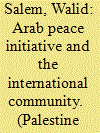

|
|
|
|
|
| Summary/Abstract |
With the ongoing stalemate on the Israeli-Palestinian bilateral track, all who actively seek peace still see the Arab Peace Initiative (API) of 2002 as a potential point of departure for breaking the impasse, contingent on the Israeli government’s readiness to accept the API as a basis for discussion. The draft United Nations Security Council resolution circulated by France refers to the API; there are reports that the United States may be developing a new API-based plan for peace; and the European Union has shown interest on many occasions in moving in that direction. Many Israeli parties have developed API-based plans for peace such as MK Yaakov Peri (Yesh Atid), the Zionist Camp, Meretz and others. Even Foreign Minister Avigdor Lieberman wants to distort the API’s content by calling for normalizing relations with the Arab countries without withdrawing from the Palestinian and Arab territories occupied in 1967.
|
|
|
|
|
|
|
|
|
|
|
|
|
|
|
|
| 2 |
ID:
138331
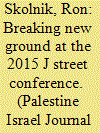

|
|
|
|
|
| Summary/Abstract |
From March 21 to 24, the pro-Israel, pro-peace lobby J Street held its fifth national conference in Washington, DC, attended by 3,000 participants. The status of the Israel-Palestine question was vastly different from the last time the group had assembled in 2013, and the gathering’s tenor and many of the messages delivered there were quite unlike those which had characterized past conferences.
|
|
|
|
|
|
|
|
|
|
|
|
|
|
|
|
| 3 |
ID:
138320
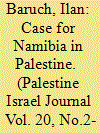

|
|
|
|
|
| Summary/Abstract |
In March 2006 I was received by President Hifikepunye Pohamba of Namibia, as the ambassador designate of Israel to that country, in his official residence in the capital city Windhoek. The tall and elegant man with a captivating beaming smile warmly received my letter of accreditation. According to protocol we sat for a short conversation. This was the opportunity for him to set the rules for our future relations.
|
|
|
|
|
|
|
|
|
|
|
|
|
|
|
|
| 4 |
ID:
138328
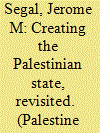

|
|
|
|
|
| Summary/Abstract |
In the spring of 1988 the first intifada was in its early months and had already achieved two big accomplishments: It had fully mobilized the Palestinian population in a way not seen in prior resistance to the occupation, and, it had won for the Palestinians worldwide attention and considerable sympathy for their plight. There was, however, a gaping hole: the absence of strategy. When you asked Palestinians in the Occupied Palestinian Territories (OPT) about how the intifada was to lead to the independent Palestinian state they said they were seeking, you got one of two answers: Either they said that the issue of grand strategy was up to the Palestinian Liberation Organization (PLO), or they invoked the idea of an international conference in which the Palestinians would be represented by the PLO and at which, somehow, the great powers — primarily the United States — would force upon Israel a Palestinian state and an end to the occupation.
|
|
|
|
|
|
|
|
|
|
|
|
|
|
|
|
| 5 |
ID:
138330
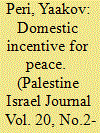

|
|
|
|
|
| Summary/Abstract |
Immediately after the polls closed, when Israel opened its eyes to an old new political reality, it was clear that the critical issues of sovereignty regarding the Palestinians will inevitably return again to the forefront. As a result, the window of opportunity which is open in the Middle East will be highlighted for all to see. The last Israeli elections, like a number of elections in the last decade, began with a clarion call to tackle social issues, economic issues and other internal matters, but in practice, the items most on the public agenda during the public campaigns were those of security and negotiations.
|
|
|
|
|
|
|
|
|
|
|
|
|
|
|
|
| 6 |
ID:
138318


|
|
|
|
|
| Summary/Abstract |
There are moments in a retired diplomat’s life when he has to give up the diplomatic protocol and say publicly, loud and clear, what is going on in his mind. This period defines such a moment. After three decades of diplomatic service on behalf of the State of Israel, in addition to years of military service in defense of the state, there is no doubt in my mind that I should now speak up.
|
|
|
|
|
|
|
|
|
|
|
|
|
|
|
|
| 7 |
ID:
138316


|
|
|
|
|
| Summary/Abstract |
While my last four years in Jerusalem have been deeply enriching and engrossing, coming up close and dealing first-hand with the ubiquitous Israeli-Palestinian conflict, they haven’t exactly been the happiest of times for those like me who are interested in a just and peaceful settlement of the conflict for Palestinians and Israelis alike. With the notable exception of the major diplomatic effort led by U.S. Secretary of State John Kerry, the situation on the ground and the political outlook has been bleak. At times it has been downright gut-wrenching. Last summer, over 2,200 people were killed in the Gaza Strip, many of whom were innocent children and civilians. This was the third military confrontation between Israel and the Palestinians in six years, only more violent and more destructive. The destruction I saw driving through Shuja’iyya — one of the largest residential neighborhoods in the Gaza Strip — is testimony to that. Once again, this latest round could have easily been avoided. Today, Gaza remains cut off and isolated, with an uncertain political outlook. A return to violence looks disconcertingly unavoidable.
|
|
|
|
|
|
|
|
|
|
|
|
|
|
|
|
| 8 |
ID:
138327
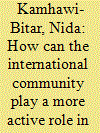

|
|
|
| 9 |
ID:
138333
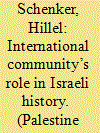

|
|
|
|
|
| Summary/Abstract |
The fact that after over 20 years of fruitless negotiations the Palestinians have chosen an internationalization strategy to try to achieve national independence is considered by the current Israeli government and its supporters to be illegitimate “unilateral action” that bypasses the need for bilateral negotiations with Israel to resolve the conflict. What those opponents of internationalization are conveniently forgetting is the major role that internationalization has played in Israeli history.
|
|
|
|
|
|
|
|
|
|
|
|
|
|
|
|
| 10 |
ID:
138324
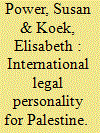

|
|
|
| 11 |
ID:
138326
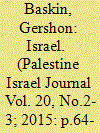

|
|
|
|
|
| Summary/Abstract |
Israel views itself as the nation-state of the Jewish people, and Prime Minister Binyamin Netanyahu demands that the Palestinians recognize Israel as such as a prerequisite to what he claims would be genuine negotiations on a two-state solution. The proposals to partition Palestine/Eretz Yisrael into two states for two peoples date as far back as 1937 to the Peel Commission, and were based on the assertion that the Israeli-Palestinian conflict is an identity-territorial conflict between two national movements over the territorial expression of their separate identities.
|
|
|
|
|
|
|
|
|
|
|
|
|
|
|
|
| 12 |
ID:
138317
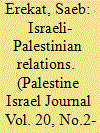

|
|
|
| 13 |
ID:
138325
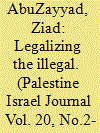

|
|
|
|
|
| Summary/Abstract |
The Israeli High Court’s decision, issued April 15, 2015, to apply the Absentee Property Law of 1950 to properties in East Jerusalem owned by Palestinians living in the West Bank, considering them absentee property, is nothing more than another tool to allow the occupation to loot Palestinian property, in the West Bank in general and in Jerusalem in particular, for the benefit of Jewish Israeli citizens.
|
|
|
|
|
|
|
|
|
|
|
|
|
|
|
|
| 14 |
ID:
138332


|
|
|
| 15 |
ID:
138323
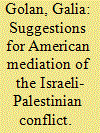

|
|
|
| 16 |
ID:
138319
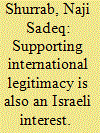

|
|
|
| 17 |
ID:
138321


|
|
|
|
|
| Summary/Abstract |
In October 2014, Sweden’s new left-wing government became the first member of the European Union (EU) to recognize the State of Palestine. Previously, Malta and Cyprus had recognized Palestine, but that was before they joined the EU. In addition, a number of Central European member states have also recognized Palestine when they were part of the Soviet Union. It is a bit unclear what the status of their recognitions is today, as some of these states (the Czech Republic in particular) have emerged as Israel’s closest allies in Europe.
|
|
|
|
|
|
|
|
|
|
|
|
|
|
|
|
| 18 |
ID:
138322


|
|
|
|
|
| Summary/Abstract |
The current Palestinian state of affairs resembles a critical case of schizophrenia. On the outside, the Palestinian leadership is actively positioning the Palestinian cause internationally. They’ve acquired membership in international organizations and are pursuing a tenacious endeavor to secure the international community’s official recognition of the State of Palestine. Internally, however, Palestinians are divided politically, disconnected from one another geographically, have little control over their land and resources and, most importantly, continue to operate under the auspices of the Oslo Accords, which make them highly dependent on Israeli inclinations.
|
|
|
|
|
|
|
|
|
|
|
|
|
|
|
|